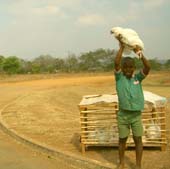Chicken traditions expose Africans to bird flu

Delegates at a bird flu summit this week in Mali, Africa, have said that some African customs could expose people to the disease unnecessarily.
In Africa, children are often responsible for rearing village poultry, and there are also many traditions and religious ceremonies involving live poultry, which can expose people to diseases including the potentially deadly H5N1 avian influenza.
Delegates at the summit said that steps must be taken to decrease the risk these customs pose.
Experts from around the world are meeting in Mali’s capital Bamako to discuss how to fight the deadly H5N1 bird flu virus and prevent it causing a human influenza pandemic.
“In Africa, it is the children’s job, supervised by the women, to look after the poultry,” said Neil Ford, a communications adviser for the UN Children’s Fund UNICEF in West Africa.
Ford said that the tradition is highly regarded, as it increases children’s sense of responsibility. “We have to come up with solutions that are compatible with (Africans’) lives and traditions,” he said.
Delegates from African countries noted that chickens are often presented as gifts to visitors and to mark special occasions, or are slaughtered in religious ceremonies.
One particularly risky form of sacrifice, practised in Benin, involves participants killing a chicken by ripping out the bird’s throat with their teeth.
Africa also has many outdoor markets, where birds are kept tightly packed in cages and are slaughtered and plucked on the spot using potentially unhygienic processes.
UNICEF’s Ford said it was common for sick poultry to be singled out for eating by families raising backyard poultry. Such practices help make ends meet in households with little food to spare, but expose the person slaughtering and preparing the bird if it is carrying any diseases.
UN bird flu coordinator David Nabarro noted that significant cultural and behavioural changes are not likely to happen quickly.













